|
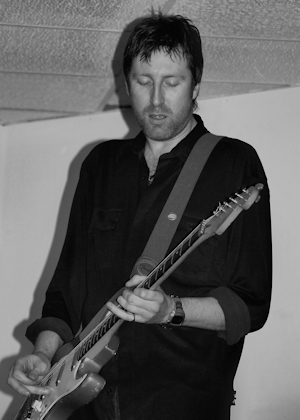 Alan:
What are your first musical memories growing up in Devizes,
Wiltshire? Alan:
What are your first musical memories growing up in Devizes,
Wiltshire?
Jon: Music was all around me when I was a
kid. I remember sitting on my Dad’s knee as he played the piano – that
must have been when I was about 3! Dad could get a tune out of anything
and was very musical. My brother Pete was also in bands and I’d hear him
playing his guitar across the landing from my bedroom.
Alan: Did you
always want to become a musician?
Jon:
Not at all – I always wanted to play
centre-forward for Liverpool! In fact, my family were always trying to
persuade me to take up an instrument, but I just wasn’t interested. I
didn’t feel the urge until I was about 15.
Alan: How did
you get started in music and who encouraged you the most?
Jon:
Pete, my brother, loaned me his acoustic
guitar when I finally expressed an interest in learning, and he showed
me my first few chords. He didn’t give me lessons, as such, he just got
me started and encouraged me to practise.
Alan: What
kind of material were you playing in the early days?
Jon:
Well, the man who inspired me to play
guitar was Mark Knopfler of Dire Straits, and I was completely obsessed
with that band for a long period. It was all I wanted to listen to, and
all I wanted to play on guitar. I wasn’t even interested in playing with
other people at that point – I was content playing along with my Dire
Straits records pretending to be Mark Knopfler! My brother eventually
managed to persuade me to listen to someone else and pointed me to Eric
Clapton.
Alan: What
first attracted you to the blues?
Jon:
Looking back now, the first couple of
Dire Straits albums were my favourites, and while I didn’t know it at
the time, they were the most ‘bluesy’ – very JJ Cale. But it was through
Clapton that I discovered the legends of blues like Muddy Waters, Buddy
Guy and BB King. There was something brutally honest about their
delivery that appealed to me. This was the late eighties, when
mainstream music was highly polished and produced, so I think I loved
the rawness and roughness of early blues recordings because it just
sounded more real.
Alan: You once
said 'liking the blues made me different', why was this?
Jon:
Well, nobody else was into it at school,
and I liked that. I didn’t like running with the pack and still don’t!
There was nothing else particularly interesting or different about me at
that time – I was really boring, in my mind – but listening to blues
music made me feel like I’d discovered something special, and I felt
like I was part of a little club that none of my friends knew about.
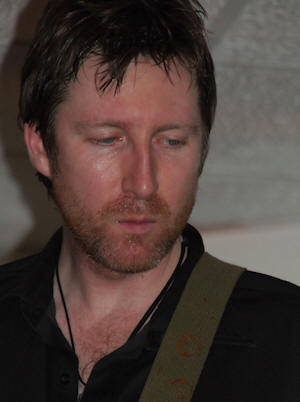 Alan:
Who are your favourite blues artists? Alan:
Who are your favourite blues artists?
Jon:
Of the original blues greats, the first
names that spring to mind are Howlin’ Wolf, RL Burnside and Muddy
Waters. If we’re talking about more contemporary artists, then Jimmie
Vaughan is a real favourite of mine. I also love The Red Devils, and
most recently The Black Keys.
Alan: What is
your favourite guitar?
Jon:
That’s easy – my beloved 1992 red Fender
Stratocaster. I paid for it in instalments, and my Dad sold his clarinet
to help pay for it. I’ve never really been a guitar collector, as such.
Having said that I do harbour a strong desire for a cherry red Gibson
335.
Alan: Are
there any particular songs that you play that have special meaning to
you?
Jon:
Yes, but I won’t go into details. I like
the fact that listeners form their own ideas about the subject matter of
songs and they figure out what it means to them, and that fascinates me.
Sometimes, a songwriter revealing what a song is all about can change
someone’s perspective on that song forever, and sometimes it can spoil
it! There are songs on my albums which are very personal to me and I’m
very proud of them.
Alan: Tell me
about The Hoax, how did you all get together?
Jon:
Myself, Jesse and Rob Davey and Hugh
Coltman all grew up in the same sleepy little Wiltshire village. We used
to play football and cricket together before we even talked about music.
Then Rob and Jess started getting interested in guitar music and they
knew that I played, so they hassled me all the time to go to their house
and jam. I wasn’t interested at first – I guess I didn’t think they’d be
any good, or I thought that I wouldn’t like what they were into. Rob
eventually wore me down, though, and we discovered we were all turned on
by the same kind of music. I think Hugh had sung in the choir at school,
and that was good enough for us so we roped him in!
Alan: How did
The Hoax name come about?
Jon:
The way I remember it is like this: We
had been booked for our first gig – a friend’s birthday party, I think –
and they needed a band name to put on the invitations. We were panicking
slightly and employing the classic method of combing newspapers for
possible band names. In the local rag, there was an article about crop
circles (of which there were a lot in Wiltshire at this time) and the
article was claiming that they were all a hoax. We thought ‘The Hoax’
would do for now and we’d change it later, but we never did.
Alan: Why do
you think The Hoax were viewed as unique by music critics?
Jon:
In the early nineties it was rare for
young guys like us to be playing blues music. Other musicians our age
were into Nirvana and Pearl Jam etc etc. So we stood out on the scene.
The blues circuit wasn’t used to seeing a bunch of kids playing with
such energy and enthusiasm, so we made quite an impact pretty quickly. I
also think the band is pretty special because there isn’t a weak link in
the band – it’s five strong characters who are all good at what they
do.
Alan: Back in
1999 you all decided to go your separate ways, why was this, given you
were considered by many as 'the best band ever seen'?
Jon:
Being good doesn’t necessarily make you
happy! Speaking personally, by 1999 I wasn’t really enjoying it any
more. I felt we’d run out of steam to an extent. It seemed that we all
had different ideas about which direction we should go and I felt our
live show had become flabby and too reliant on guitar solos. I was also
feeling stifled, not only as a guitarist but as a songwriter, and I just
felt like doing something different with some different people. I told
the guys this at a meeting and I expected them to carry on without me,
but as it happened Hugh felt much the same as me, so we decided to stop.
I think Rob and Jess were disappointed – they wanted to do different
things, too, but they wanted to keep The Hoax going in some capacity.
That didn’t make sense to me – back then, I felt that if we weren’t
going to give The Hoax 100% we shouldn’t do it at all.
Alan: The Hoax
recently finished a mini tour to celebrate the band's 20th anniversary
with rapturous acclaim from devoted fans, are there any plans for
another tour?
Jon:
Yeah, we all really enjoyed the
anniversary shows and the reaction from the public was amazing. We are
talking about doing some more shows in the summer of 2010.
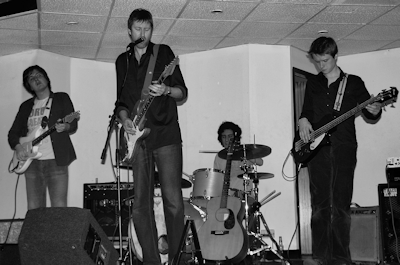 Alan:
Tell me about the Jon Amor Band, when did you get together with Dave
and Chris Doherty and Simon Small (Si)? Alan:
Tell me about the Jon Amor Band, when did you get together with Dave
and Chris Doherty and Simon Small (Si)?
Jon:
I disbanded my original ‘Amor’ line-up in
2004 and spent the next year or so recording my ‘Unknown Soldier’ album
and just playing solo acoustic shows. Dave Chris and Si had become
friends of mine in Devizes and I got on really well with them and liked
what they did musically, so when the idea of doing a launch party for
Unknown Soldier came up, they offered their services as my backing band
and I was really excited about that idea. We did a great launch gig in
Devizes in July 2006, and we enjoyed it so much we decided to do a tour
the following winter, and I’ve been playing with those guys ever since.
They’re terrific fun to tour with, and they’re a bit younger than me so
it keeps me feeling youthful!
Alan: Who
influences you the most in your music writing and playing?
Jon:
That’s a really difficult question to
answer, because I listen to so much different stuff and my influences
are changing all the time. Most recently, I’ve really enjoyed the
guitar-playing approach of JJ Cale and Jimmie Vaughan – very minimalist
and extremely soulful and melodic. Over the last couple of years I’ve
really enjoyed listening to Ray LaMontagne and he’s definitely been an
influence on my songwriting.
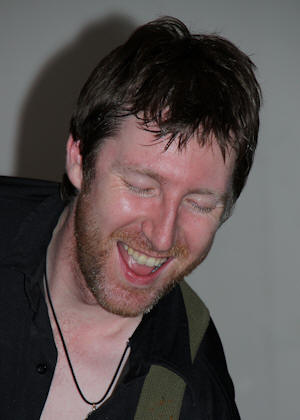 Alan:
You popped in to the traditional late-night jam session at the recent
Carlisle Blues Festival - a big surprise the fans, tell me about the
session. Alan:
You popped in to the traditional late-night jam session at the recent
Carlisle Blues Festival - a big surprise the fans, tell me about the
session.
Jon:
Ha ha! Yeah, that was great. I was in
Carlisle for the weekend playing some solo acoustic shows at different
venues, and it was a happy coincidence that the Blues Festival was on at
the same time. I remembered the late night jam from before, so I just
rocked up with my guitar and had a great time. Sam Kelly’s band were
holding it all together, and I really enjoy playing with Sam – he’s a
great drummer and we had fun just bouncing off each other. I also got to
play with my old band-mate Mat Beable. A great night!
Alan: Tell me
about the making of your latest album 'Stories From The Crooked Room'?
Jon:
I had a bunch of songs that I’d written
over the course of 2008, but I didn’t really know what to do with them.
I had no record deal and no money, so I was struggling to see how I’d
get any recording done. Dave Doherty suggested we use his recording gear
just to demo the songs, so we cleared out my front room and set up a
basic live recording session right there. I had ten songs, and I figured
if I could get 6 half-decent demo recordings out of the two days we had,
I’d be happy. Thanks to the fantastic contributions by Dave, Chris and
Si, it turned out to be far more creative and productive than I’d
imagined. Like I say, we had ten songs and 2 days to record them in, so
in some cases it was literally a case of playing the song to the guys
for the first time, giving them half an hour to work out the changes and
the chords, and then hitting the record button! It was quite
exhilarating, and I’ve never recorded like that before, but it really
helped capture an energy and ‘live vibe’ that we probably wouldn’t have
got otherwise. So, all of a sudden I had an album that I was really
proud of!
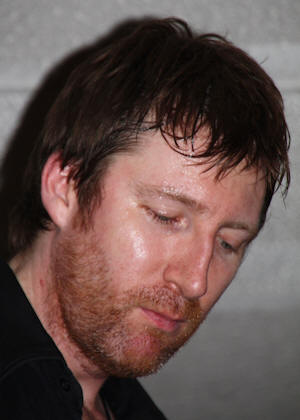 Alan:
Some music styles may be fads but the blues is always with us. Why do
you think this is? Alan:
Some music styles may be fads but the blues is always with us. Why do
you think this is?
Jon: I think it’s probably because Blues
is pretty much the root of all modern music, and in its purest form it
transcends fashion and fad and trend. The raw honesty of the genre will
always appeal to people and capture their imaginations.
Alan: How do
you see the future of blues music?
Jon:
I think it’s looking pretty healthy at
the moment, in the UK at least. There are a few good young acts on the
circuit who will improve if they stick around long enough, and the
internet is becoming instrumental in bringing blues fans together and
creating a real community about the genre. Earlyblues.com is a great
example of that. Musically, I look for originality and honesty and if
there’s plenty of that the music will thrive.
Alan: What are
your future plans / gigs / tours / albums?
Jon:
The next big thing on the horizon for me
is a UK tour in April. We’re being very hip and 21st century
and launching the latest album ‘digitally’, releasing it on iTunes and
other internet platforms, so we’re going to tour around that. I’ve
started writing again tentatively, and I have a few ideas kicking
around, but I really want to make sure that the ‘Crooked Room’ album
gets the attention it deserves.
_________________________________________________________________________
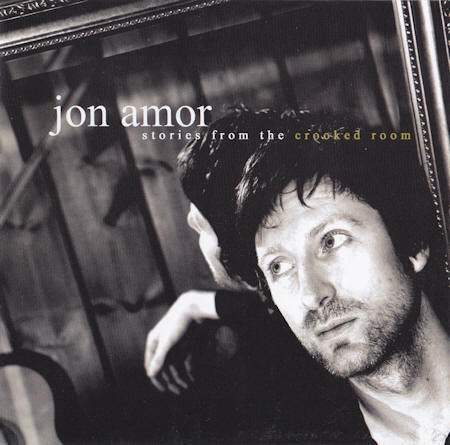
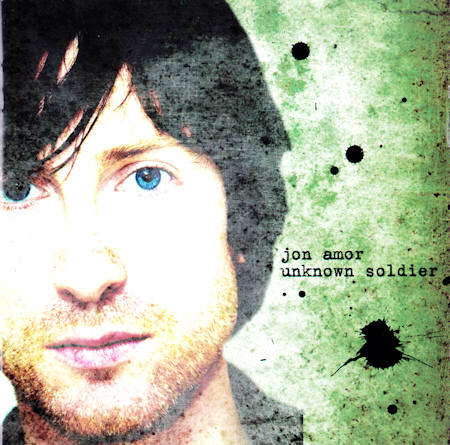
Albums available from Jon's website:
www.jonamor.com
Return to
Blues Interviews List
Website, Photos © Copyright 2000-2010 Alan
White. All Rights Reserved.
Text (this page)
© Copyright
2009 Alan
White &
Jon Amor.
All Rights Reserved.
For further information please email:
alan.white@earlyblues.com
|









 Alan:
What are your first musical memories growing up in Devizes,
Wiltshire?
Alan:
What are your first musical memories growing up in Devizes,
Wiltshire? Alan:
Who are your favourite blues artists?
Alan:
Who are your favourite blues artists? Alan:
Tell me about the Jon Amor Band, when did you get together with Dave
and Chris Doherty and Simon Small (Si)?
Alan:
Tell me about the Jon Amor Band, when did you get together with Dave
and Chris Doherty and Simon Small (Si)? Alan:
You popped in to the traditional late-night jam session at the recent
Carlisle Blues Festival - a big surprise the fans, tell me about the
session.
Alan:
You popped in to the traditional late-night jam session at the recent
Carlisle Blues Festival - a big surprise the fans, tell me about the
session. Alan:
Alan:

